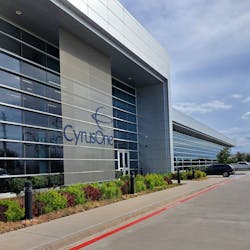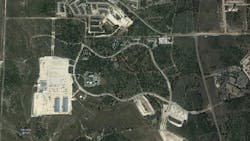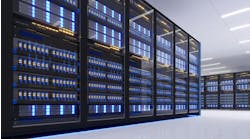The CyrusOne Dallas DFW3 data center at 2300 Chelsea Blvd in Allen, Texas sits on over 90 acres in a kind of land moat ringed by an expansive K-Rated security fence. The facility will contain 580,000 SF (greater than 10 football fields) of raised floor/white space at full build-out.
During our tour last October contiguous with the annual 7x24 Fall Conference, Data Center Frontier was extremely fortunate to be at DFW3 at a time of heightened delivery activity. Inside the facility, which is in the midst of a significant expansion, we saw scores of pallets with data center rack and power infrastructure waiting to be installed.
Also, as an old ICT cabling editor, inside DFW3, this author was excited to see his first Gordon Grid ceiling in active deployment, vaguely like staring up into some MC Escher form, except perfectly practical and logical (more on this soon).
A 'Massively Modular' Approach
Peter Macmillan, Global Account Manager at CyrusOne in Dallas, was our DFW3 tour guide.
Macmillan noted that CyrusOne's modular ethos is intended to enable fast data center deployment. "Certainly not all colocation providers are created equal," he said. "The key differentiator at CyrusOne is its massively modular approach."
Macmillan continued, "We have a somewhat standard kit of parts that we deploy across all different markets, and that makes our speed of deployment one of the fastest in the industry. That's why we can build data centers quicker than the competitors can."
CyrusOne Background and Looking Ahead
In 2022, investment giants KKR and Global Infrastructure Partners acquired CyrusOne for $15 billion, taking the data center developer private in what was, at the time, the largest M&A deal in the history of the data center sector.
The company has more than 50 data centers around the globe, spanning from North America to Europe to Asia.
In reporting last October, Dallas Morning News real estate editor Steve Brown noted that CyrusOne was planning for for almost 1 million square feet of construction in another data center expansion at its Allen campus, located near U.S. 75 and known as one of Texas’ largest tech complexes.
CyrusOne broke ground in 2017 on the first phase of the Allen campus, forecast at the time to be a $600 million project, with Dallas DFW3. As reported by Brown, last August, the company filed plans for a $50 million, 82,750-square-foot expansion of the data center campus.
In his reporting last fall, Brown noted that in October, CyrusOne signaled it would start work early in 2024 on another $31 million, 126,005 square foot facility addition, according to planning documents filed with the state.
With construction scheduled for completion late next year and JHET Architects identified as the designer, the project is described in the documents as a “new construction, single-story data center with two-story office component.”
The new facility will be CyrusOne’s fourth in Dallas-Fort Worth. It will sit next to the 976,000-square-foot, 50 megawatt facility at 2300 Chelsea Boulevard. As further noted last October in real estate industry reporting at The Real Deal, Chelsea Boulevard is a quiet suburban road lined with single-family homes. CyrusOne owns about 90 acres where the road meets Ridgeview Drive, according to Collin County property records. Tierpoint also operates a data center nearby.
As we walked down one of many long hallways at DFW3, Macmillan remarked, "This is building one of the three building campus. When this was originally designed, it was designed that the first building would have three 60 thousand square foot data halls, 12 MW in each. Then the second building would have two levels with a total of seven data halls, and then the same for building three."
He explained further, "In the data halls, we can have individual cabinets, we can have cages, we can have customers take down an entire data hall. Whatever the customers need, we can kind of adapt. Our standard design is on raised access floor, so we'll pump the air into the subfloor, up through the plenum into the cabinets. But we can do chilled water, loop, rear door heat exchangers, liquid to chip, you name it."
Build to Suit Data Center AI and Sustainability Intiatives On Deck
One of the signal moments in 2023’s inflection point “summer of AI” for the data center industry was CyrusOne’s launch in late August of its Intelliscale platform, an artificial intelligence (AI) workload-specific data center build-to-suit offering, tailored to address the rapidly growing needs of AI applications and services.
The company contends that the rush of AI workloads demanding increased performance and density will require data centers with increased scale and a bespoke design. To meet this demand, in conjunction with its technology partners, CyrusOne said developed Intelliscale as a cornerstone enhancement to its build-to-suit capabilities.
In announcing the platform, the company emphasized that its modular manufacturing approach to data center development enables customers to utilize a mix of liquid-to-chip cooling technology, rear door heat exchanger cooling systems, and immersion cooling advancements to achieve efficient cooling up to 300 kW per rack, even under the most demanding AI workloads.
In launching the product, CyrusOne said the Intelliscale solution "offers the ability to create a super high-density environment in a smaller building to maximize efficiencies across the board," while noting that "in some instances, existing facilities can be retrofitted to address dense AI deployments."
The company said the build-to-suit platform is purpose-built to operate with minimal land usage, offering a custom variety of redundancy configurations. CyrusOne contends its Intelliscale data centers can occupy just 25% of the space of a typical facility, depending on application and needs.
Last September, CyrusOne announced its promotion of Jim Roche to Senior Vice President of Engineering. The role puts Roche in charge of the company's engineering development team, overseeing engineering and design services including power and usage projections, floor planning, connectivity assessments and implementation scheduling.
Roche most recently served as Vice President of Engineering at CyrusOne. Since joining the company in 2014, Roche has become known as a trusted, collaborative partner to CyrusOne's customers, and an effective team leader with strong communication and management skills.
CyrusOne noted that Roche has helped drive the company’s sustainability initiatives and ensure customers’ design requirements are met with efficiency and consistency.
“As I step into this new role, I am excited to lead CyrusOne’s world-class engineering team as we work to implement solutions for our customers that address the challenges facing today’s digital landscape," Roche said. “We are focused on designing solutions for our customers’ needs today, such as super high-density environments, while also considering what the future might bring.”
Prior to joining CyrusOne, Roche worked for nearly 20 years in the data center design and build industry, served on numerous boards, and held multiple leadership roles within the industry.
“This promotion, given Jim’s experience and success at CyrusOne, bolsters the company as we pursue growth opportunities and further our sustainability efforts,” said Eric Schwartz, CEO of CyrusOne. “Jim has done a tremendous job shaping a positive team culture that upholds our company values and encourages collaboration while delivering value to our customers. We look forward to seeing what’s next and are thrilled to welcome him to this leadership position.”
CyrusOne's National and Global Reach Expands in Texas and Beyond
Cushman & Wakefield's mid-year 2023 DFW Data Center Report stated that the Dallas-Fort Worth Metroplex hasd approximately 865K SF of data center space under construction, amounting to 140 MW of IT capacity.
As frequently noted at DCF, the Dallas market has long been one of the primary peering and interconnection hubs in the U.S., featuring excellent proximity to cloud providers and exchanges.
In recent years, the region has also become a major destination for hyperscale operators, including major campuses for Meta and Google, who is investing $600 million to build a data center in nearby Red Oak, Texas, a known locus of intense data center development, as evidenced by recent announcements from Compass Datacenter and Schneider Electric.
The Dallas market saw 110 MWs of data center capacity absorbed in the first half of 2023, according to CBRE data from last year, pushing the vacancy rate down to just 4 percent. There was 273 MWs of capacity under construction in the first half of 2023, but also 246 MWs of pre-leasing, meaning most new data center capacity is under contract during the construction phase.
Notably, CBRE analysis also saw just 1.7% of vacant data center space in Austin to the south and San Antonio to the north. While that level represented a trend slightly up from 2022, it’s also the second-lowest vacancy rate in the country for data center markets.
Last November, the San Antonio Business Journal's James McCandless reported that CyrusOne is preparing to break ground on a 279,730-square-foot data center at the former Texas Research and Technology Foundation campus on San Antonio's west side. The plans include a two-story center and an office area, according to a filing with the Texas Department of Licensing and Regulation.
The Nov. 10 filing indicated that construction could start this April and be completed by the end of 2025, noted McCandless, who further reported that CyrusOne had purchased the land at San Antonio's 14815 Omicron Drive in 2021 for an undisclosed amount, as shown by Bexar County records. "A site plan filed at the time showed two buildings — dubbed SAT 8 and 9 — rising at the Omicron Drive site, though details were scarce," wrote McCandless.
The reporting further noted that last September, CyrusOne acquired more than 25 acres at nearby 15355 Lambda Drive for the construction of two data centers, designated as SAT10 and SAT11. "The western edge of Bexar County — stretching into Medina County — has become a hot spot for data center development, with Microsoft and Stream Data Centers being a few of the players making moves in the area recently," added McCandless.
CyrusOne already has at least three data centers in San Antonio with combined processing capacity of 63 megawatts, according to its website. The potential new data center would be located just south of its SAT5 facility, noted McCandless' reporting.
On our tour, CyrusOne's Macmillan confirmed his company's impressive national and global reach:
"Northern Virginia is our biggest data center market. We've actually got twelve [facilities there] now. Within some of the sites, some customers have liquid rear door heat exchangers. We no longer have the Houston sites, they are kind of our legacy - they were sold to DataBank. We have our four sites in Dallas: so Lewisville, Carrollton, TX3, and soon-to-be TX4.
We have two sites in Austin, five in San Antonio. In Phoenix is one big campus - that's a really cool site over there. And then we've got legacy sites in Chicago from acquisitions, and five sites in Cincinnati. West 7th Street is kind of like the Infomart of Cincinnati.
Then we've also got some sites out in Europe. They just opened Frankfurt (FRA5). I know that there's now two [data centers] in Amsterdam; France has maybe two now, and a couple of new ones are coming soon in other countries."
In early 2023, CyrusOne also formed a joint venture to develop and operate more data centers in Japan.
CRAH Gallery and Gordon Grid
Standing in the entrance of DFW3's data hall three, Macmillan explains the building's cooling system, including its raised floor.
"We have our CRAH gallery here," he says. "This is where all of the cold air is pumped into the plenum, and then it goes up through the cabinets, the return is in the ceiling. We have our dividing walls here, segregating the different data halls, a polycarbonate wall system. As far as cages go, we can do whichever kind of configuration the customer prefers. This is the clear so you can see through it, we have other customers that have solid walls. Some go line foot, some go all the way up to the dorm grid. Then other customers have top wall barriers as well for extra added protection, and some customers like a topper."
Notably, Macmillan adds, "This site and most of our sites are waterless. So it's a closed, chilled water loop, and therefore, it's zero water. Other sites, other providers don't have zero water. So it's kind of a neat sustainability story that we can tell."
I ask Macmillian for a bit more information about the Gordon Grid ceiling overhead.
"This is a program kind of near and dear to my heart," he says. "This is something I came up with a couple of years ago. It's the equipment leasing program. So normally, when customers take space in an environment, they'll purchase their own cabinets and PDUs, and then they'll purchase the whips from us. So this package is basically an amortization of a cabinet, two PDUs, and the whips as part of their rent. So they'll pay an actual amount to just lease the equipment. Hence, equipment leasing program."
On the Gordon Grid ceiling, Macmillan remarks further, "I don't know how many of our competitors use it. We use it in all of our sites that I'm aware of - it's a really great product. It's our standard. It's got 300 pounds of cabling, that's the key thing. So we can just hang cable trays straight from the grid, and it just makes installs really easy. Then we've also got our VESDA system intertwined in it."
Interconnection
Standing before a large diagram affixed to one of DFW3's hallway walls, Macmillan gives us a rundown of CyrusOne's Metro Internet Exchange (IX) footprint, a highly reliable network connection between data centers within the metropolitan area where CyrusOne facilities reside. "With Metro IX, our customers experience improved network performance and a thickened layer of network resilience at a fraction of the cost," states the company).
We also are briefed on the CyrusOne National Internet Exchange (IX), which meets requirements for connectivity by delivering carrier-class infrastructure to data centers. As reckoned by CyrusOne, the neutral platform provides dedicated high-speed multiple carrier waves and multiprotocol label switching (MPLS) between sites already in place, all of which can be delivered from simple cross-connects or a dynamic IX Ethernet switch port.
Standing back at the data hall entrance, Macmillan clarifies,
"Ultimately this will be two 60 thousand square foot data halls supporting however many megawatts are required. I say that because we had an original plan for this to be a 27 megawatt site in this first building. But if customers need more density, we can adapt and make it a more dense site as needed. Just add more UPS, chillers, gens.
We're currently in the process of building out data hall two. That's why there's so much activity. A couple of months ago, this was just empty. Just a giant warehouse."
Asset Securitization
In November 2023, Asset Securitization Report's Donna M. Mitchell revealed that "CyrusOne Data Centers' Issuer is preparing another issuance of asset-backed securities from a master trust set up to securitize a pool of tenant leases and other revenue from six data centers, raising $488 million."
The report added, "The series 2023-2 will issue one tranche of notes from the master trust, an A2 class that has a legal final maturity of 25 years, according to ratings analysts from S&P Global Ratings. CyrusOne Data Centers Issuer, 2023-2 is slated to close on November 22, with almost the same line up of managers that appeared on the first deal, according to Asset Securitization Report's deal database."
Barclays, Citigroup Global Markets, Goldman Sachs and Wells Fargo Securities were reported as managers on the deal, according to the database; S&P identified KKR Capital Markets as another arranger.
See Also: CyrusOne CEO Eric Schwartz Talks Intelliscale AI Data Centers’ 300 kW Racks, And More

Matt Vincent
A B2B technology journalist and editor with more than two decades of experience, Matt Vincent is Editor in Chief of Data Center Frontier.








